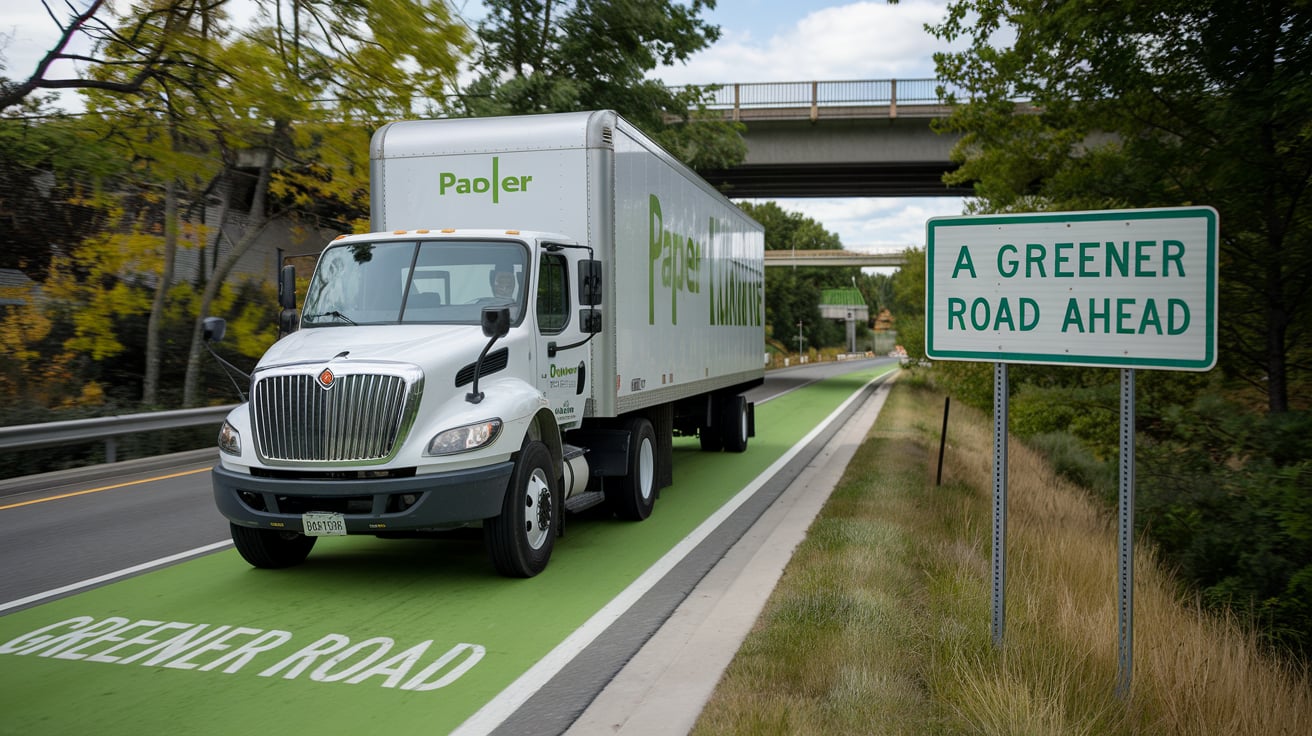Green Bay, Wisconsin – As the trucking industry grapples with the dual challenges of reducing carbon emissions and maintaining operational efficiency, one company is proving that innovation and sustainability can go hand in hand. Paper Transport, Inc. (PTI), a trailblazing truckload carrier based in Green Bay, Wisconsin, has embraced renewable natural gas (RNG) and compressed natural gas (CNG) as alternatives to diesel, setting an example for the sector.
The Beginnings of a Natural Gas Journey
PTI’s journey into natural gas-powered trucking began over a decade ago, long before the current push for sustainability became mainstream. Dan Depper, Vice President of Maintenance at PTI, recalls those early days: “When I started, we were assembling systems piecemeal—chassis, tanks, and components from different suppliers. It wasn’t easy, but we saw the potential.” Today, advancements in technology and partnerships with companies like Hexagon have streamlined this process, making natural gas adoption far more practical.
Why RNG and CNG?
Two primary factors drive PTI’s commitment to natural gas:
- Environmental Benefits: RNG, derived from organic waste like dairy farm methane, offers a near net-zero carbon footprint. In some cases, it can even achieve negative emissions, a compelling factor for environmentally conscious clients.
- Technological Advancements: Cummins’ new 15-liter natural gas engine, poised for deployment, promises enhanced power and efficiency, enabling natural gas trucks to tackle more demanding routes previously dominated by diesel.
Fleet Evolution and Customer Demand
Currently, 10% of PTI’s fleet runs on natural gas, with plans to expand this number significantly. Dedicated routes—carefully planned to align with existing fueling infrastructure—are the backbone of their operation. From Midwest runs between Green Bay and Chicago to routes in St. Louis, Southern California, and the Northeast, PTI demonstrates the feasibility of natural gas trucking across diverse regions.
“Customer demand is growing,” Depper shares. “While not every client prioritizes sustainability, many do, and RNG offers them a tangible way to meet their environmental goals without compromising cost-effectiveness.”
Financial Considerations
Adopting RNG and CNG trucks comes with higher upfront costs but offers lower fuel prices and comparable lifetime expenses. With diesel prices fluctuating and often exceeding $4 per gallon, RNG becomes an attractive alternative. PTI’s Chief Commercial Officer, Jared Settle, explains, “At around $3.75 per gallon diesel equivalent, RNG achieves cost parity. Beyond that, it’s cheaper, making it a stable and predictable choice for cost-conscious operations.”
Driver Perspectives
For PTI drivers, the transition to natural gas has been largely seamless. Lee Peterson, a 10-year veteran, praises the advancements: “The new trucks match diesel in power and torque, and they’re quieter. After a 10-hour shift, I feel more relaxed compared to driving diesel.” Peterson’s enthusiasm underscores the improved driving experience brought about by modern natural gas technology.
Scaling Up for the Future
Looking ahead, PTI plans to capitalize on Cummins’ 15-liter engines, enabling heavier loads and mountainous routes, which were previously challenging for natural gas trucks. “This isn’t just about replacing diesel; it’s about growing the pie,” says Settle. “New routes, new opportunities, and a larger percentage of natural gas in our fleet—that’s the vision.”
The Bigger Picture
As sustainability becomes a non-negotiable aspect of business, PTI’s story highlights the importance of perseverance and innovation. From early struggles with nascent technology to becoming a leader in natural gas trucking, their journey serves as a blueprint for others.
Renewable natural gas is not just an environmental solution—it’s a viable business strategy. With advancements in technology and increasing customer demand, the future of RNG and CNG trucking looks promising. PTI is not only navigating this green path but also paving the way for others to follow.

